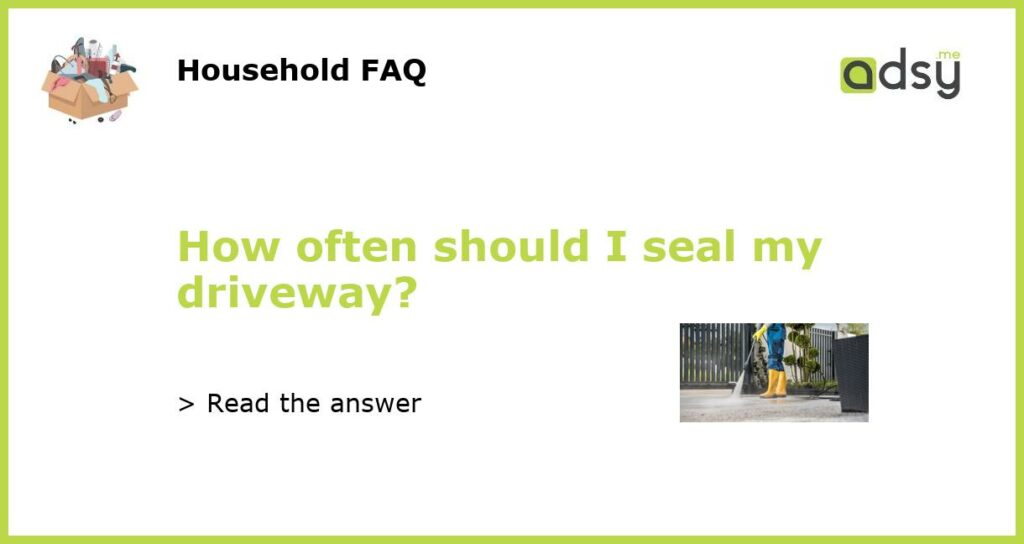Why It’s Important to Seal Your Driveway
Sealing your driveway is an essential part of maintaining and protecting your investment. Your driveway is constantly exposed to the elements, such as sunlight, rain, snow, and ice, which can all cause damage over time. Sealing your driveway creates a protective barrier that helps prevent cracks, potholes, and other forms of deterioration.
Without regular sealing, your driveway becomes vulnerable to the effects of weathering and oxidation. The sun’s ultraviolet rays can break down the asphalt binder, causing it to weaken and crack. Water can seep into these cracks, leading to further damage as it freezes and expands during the colder months. By sealing your driveway, you can minimize the risk of these issues and extend its lifespan.
Factors That Determine How Often You Should Seal Your Driveway
The frequency at which you should seal your driveway depends on several factors. These factors include the climate in your area, the age of your driveway, the amount of traffic it receives, and the type of sealer used. Generally, it is recommended to seal your driveway every 2-5 years, but it is important to consider these factors to determine the ideal timeframe for your specific situation.
If you live in an area with extreme weather conditions, such as high temperatures or heavy rainfall, you may need to seal your driveway more frequently. The constant exposure to these elements can accelerate the deterioration process, making regular sealing even more crucial.
The age of your driveway also plays a role in determining how often you should seal it. Newer driveways may not need to be sealed as frequently, as they are less likely to have extensive damage. However, if your driveway is older and already showing signs of wear and tear, more frequent sealing may be necessary to prevent further deterioration.
The amount of traffic your driveway receives also impacts its maintenance needs. If you have multiple vehicles regularly driving on your driveway, especially heavy vehicles like trucks or RVs, the wear and tear on the asphalt will be greater. In these cases, more frequent sealing may be required to maintain the integrity of your driveway.
Lastly, the type of sealer used can influence the longevity of the protection it provides. Different sealant products have varying levels of durability and resistance to weathering. It is important to choose a high-quality sealer and follow the manufacturer’s instructions for application and reapplication.
Signs that Your Driveway Needs Sealing
While there is a general guideline for how often you should seal your driveway, it is important to pay attention to specific signs that indicate the need for sealing. These signs include visible cracks, potholes, faded color, and water pooling.
If you notice cracks on your driveway’s surface, especially larger or growing cracks, it is a good indication that it needs to be sealed. Cracks allow moisture to penetrate the asphalt, leading to further damage over time. Similarly, potholes should be addressed promptly to prevent further deterioration.
Faded color is another sign that your driveway needs sealing. Over time, the sun’s ultraviolet rays can cause the asphalt to lose its color and become dull or gray. Sealing your driveway can restore its color and protect it from further fading.
Lastly, water pooling on your driveway after rainfall is a clear indication of inadequate drainage. If water is not draining properly, it can seep into the asphalt and cause damage. Sealing your driveway can help prevent this issue and ensure proper water drainage.
Benefits of Regular Driveway Sealing
Regular driveway sealing offers several benefits beyond preventing damage and extending its lifespan. One of the main advantages is that it enhances the overall appearance of your property. A well-maintained driveway can significantly improve your home’s curb appeal, making it more attractive to potential buyers if you ever decide to sell.
Furthermore, sealing your driveway helps reduce the risk of accidents and injuries. Cracks and potholes can create tripping hazards, especially for children or older adults. By sealing your driveway and keeping it in good condition, you can minimize the chances of accidents and provide a safer environment for your family and visitors.
Sealing your driveway also helps protect your investment. A new driveway can be a significant expense, and by properly maintaining it, you can avoid costly repairs or replacement in the future. Regular sealing is a proactive approach to preserving your driveway’s functionality and aesthetics.
Hiring Professional Sealcoating Services
While some homeowners may choose to seal their driveways themselves, hiring professional sealcoating services can offer several advantages. Professional contractors have the necessary expertise and equipment to ensure proper application and long-lasting results.
Professional sealcoating services can also provide additional services, such as crack filling and pothole repair, which can further enhance the longevity of your driveway.
When hiring a sealcoating contractor, it is important to do your research and choose a reputable company with positive reviews and a proven track record. Requesting references and obtaining multiple quotes can help you make an informed decision and ensure you receive quality service.

